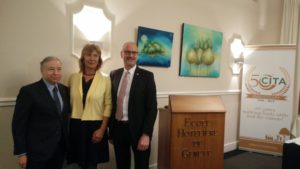CITA at the 82nd Inland Transport Committee
 The 82nd edition of the Inland Transport Committee (ITC), the highest policy-making body of the UNECE in the field of transport, took place in Geneva from the 25 to the 28 February 2020.
The 82nd edition of the Inland Transport Committee (ITC), the highest policy-making body of the UNECE in the field of transport, took place in Geneva from the 25 to the 28 February 2020.
5 years post COP-21 and the Paris Agreement, and 1 year into the implementation of ITC’s Strategy until 2030, the ITC high-level panels addressed the defining challenges of our time – climate change and the environment – under the theme “Environmental challenges to sustainable inland transport”.
On the 25 February, during the high-level segment, Transport Ministers and High-level officials from across the globe signed a Declaration in order to make a united call for universal action to address the climate and environmental emergencies.
This Declaration recognizes the Committee’s relevance as a main avenue of the international efforts to find solutions for these challenges and by calling upon world transport leaders to embrace and intensify their support for the work of the Committee as the UN Platform for Inland Transport, to the benefit of the global community.
In the course of the same high-level policy segment, CITA President – Mr. G. Müller – addressed CITA’s point of view on the matter: “Whole-life vehicle compliance is a precondition for safe and clean roads, and vehicle inspection is a precondition for whole-life vehicle compliance”
At the end of the day, more then 100 delegates from around the world were invited by CITA in a evening reception. Mrs Olga Algayerova – UNECE Executive Secretary – and Mr Jean Todt – UN Secretary General’s Special Envoy for Road Safety – expressed their thoughts on road safety after the CITA President.
“People around the world need to have access to the safest vehicle possible. It is also important that these vehicles are maintained to keep high standards they had when they were new. The only way to ensure safe and clean vehicles is with an impartial assessment to perform whole life compliance” said Mr. Müller.
Over the all ITC week, Member States – Contracting Parties and transport leaders sought out also common solutions, shared region/country specific challenges from around the world in the implementation of existing, and the development of new, UN Conventions, and tried to take strategic decisions on cutting-edge areas such as road safety, autonomous vehicles and transport digitization.


